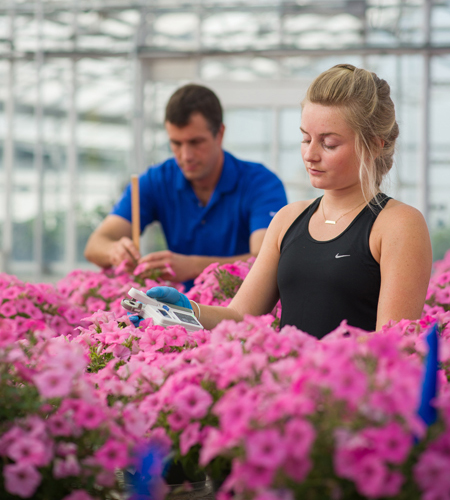Greenhouse Detectives

When Mill Gardens Farmstand moved from Hanover to Orford five years ago, grower Robb Day noticed something was wrong with the nursery’s perennials.
"The first water test we took was different. Our chlorides were higher, and we started seeing some burning on the leaves of the perennials," he says. Day needed advice on how to keep his plants healthy — and ready to sell to customers.
He turned to UNH Cooperative Extension for answers. Ryan Dickson, an Extension professor/specialist in greenhouse management and technology, and Cathy Neal, an Extension professor/specialist in landscape and nursery production, helped Day identify the source of the chlorides: Road salt was leaching into the nursery's well. Extension, along with a consultation with Mill Garden's fertilizer supplier, helped Day establish a new fertilizer regime to deal with the excess salts.
"Plants are really bad communicators," Dickson says. "When they're not happy, they turn yellow, and then they turn brown and die. But other than that, we don't know what’s going on with them."
When commercial growers call, specialists like Dickson and Neal become greenhouse detectives. Extension's research helps growers answer tough questions, improve production and ultimately boost local industry.
"We work with Extension often," says Peter van Berkum, owner of Van Berkum Nursery in Deerfield. Dickson and Cheryl Smith, an Extension professor/specialist in plant health and disease, are currently conducting research on the planting media used in his greenhouse. Van Berkum has previously turned to Smith and Extension's entomology specialist Alan Eaton for advice.
"If they weren't around, we might have to go out of state or hire someone to do this, and I'm not sure who that would be," van Berkum adds.
Some research happens on site at the greenhouses, but Dickson also brings plants back to UNH to study, with students assisting in the research. The work is useful for commercial growers even when their plants are seemingly happy.
At D.S. Cole Growers in Loudon, head grower Chris Schlegel met with Dickson in 2016 to talk about ways the greenhouse could improve operations. One area they needed help with was finding optimum moisture levels for propagating plants, and Dickson designed experiments to track moisture levels.
"Sometimes as growers in a commercial setting, we're not always diligent about setting up good experiments. Ryan worked with a couple of our growers and left them with tasks to keep recording the data," Schlegel says.
 Data collection began in January, and though it's still ongoing, Schlegel says Dickson's research has already helped D.S. Cole improve procedures. "Moisture level in the growing media is one of the most critical parts of growing good crops," she says. "If we're not handling them right from the start, it can delay crops and cause crop loss, so it has a tremendous impact, quality-wise … and with economic repercussions."
Data collection began in January, and though it's still ongoing, Schlegel says Dickson's research has already helped D.S. Cole improve procedures. "Moisture level in the growing media is one of the most critical parts of growing good crops," she says. "If we're not handling them right from the start, it can delay crops and cause crop loss, so it has a tremendous impact, quality-wise … and with economic repercussions."
Henry Huntington, co-owner of Pleasant View Gardens in Loudon, agrees. At Pleasant View, Dickson is tracking water and nitrogen levels to identify possible water and fertilizer management improvements. "It's all about the power of the university," Huntington says. "It allows for research to happen that would be very difficult for us to do. To have somebody of Ryan’s caliber and education, along with the power of the university's resources, available to us, makes a lot of sense."
Dickson is also conducting research on new and different kinds of growing substrates — materials such as peat moss, coconut coir and wood fiber that are used to grow plants. He also researches fertilizer and watering strategies that help growers promote the performance of plants after they leave the greenhouse. No matter what the focus, though, Dickson believes that translating how plants are feeling is a boost for growers and, ultimately, their customers.
"Growers are really manufacturers," he says. "They're manufacturing living plants, and just like in a factory, every step and process needs to be consistent. If the substrate, irrigation water quality or fertilizer program is not consistent, growers are more likely to incur plant loss, which directly hurts their bottom line."
This story originally appeared in the 2017 edition of Radius.
